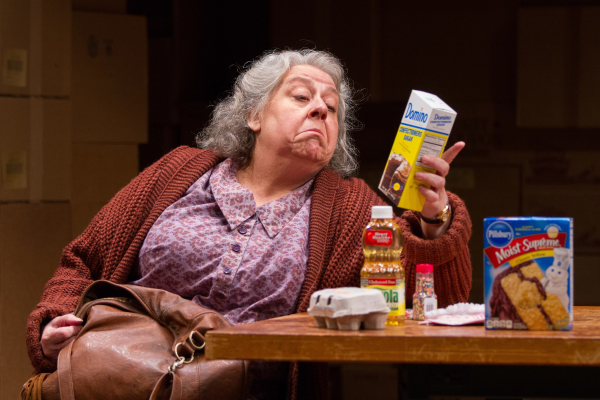The Shoplifters

(© Teresa Wood)
In the first play of Arena Stage's 2014-2015 season, Canadian playwright Morris Panych uses a novel source for inspiration: shoplifting. Yet, despite the fact that it is grounded in the world of felonies and misdemeanors, The Shoplifters is a delightful comedy, centered on a veteran shopper with sticky fingers, Alma (Jayne Houdyshell), who scoffs at the measly senior-citizen discounts the government and retail stores offer her, in favor of a more substantial method she has perfected over the years.
Alma has decidedly unconventional views on ownership. She points out that "pharmaceutical items" that are said to have been "stolen" have actually gone to cure sick children in Africa. Alma has become something of a celebrity in the shoplifting culture. To address the need of the many hungry poor she sees every day, she has set up a discount sandwich shop using all the bread, mayonnaise, and luncheon meats she can pilfer from the grocery stores in her neighborhood. Alma is such a hero in the shoplifting world, she inspires a younger woman, Phyllis (the talented Jenna Sokolowski) to be her partner-in-crime at a large grocery store. All goes well until the women decide to stuff sixteen-ounce rib-eye steaks under their skirts and head for the exit.
At that point they are stopped by an observant but naive security guard, Dom (Adi Stein), who insists that his more laid-back mentor, Otto (Delaney Williams), get involved in the thievery. Otto, who sees the world as complicated a place as Alma does, is about to be fired for his lackadaisical attitude toward shoplifting, and his tendency to see the bigger picture when it comes to petty crime.
Houdyshell gives a delightful performance as the no-nonsense Alma, who is convinced she knows everything there is to know about the law, society, and ethics. Houdyshell's careless energy and lazy grace allow her to run circles around Otto and Dom. Sokolowski is very effective as Alma's polar opposite, a nervous hanger-on who wants to celebrate her birthday with Alma at the end of the shoplifting gig, without actually having to play the game.
Stein is hilarious as the young Dom, whose eagerness to do the right thing keeps him from seeing what is happening right in front of him. The part of Otto feels as if it has been written for Williams, who plays it with the magnanimous grace of a man with a big soul, who values people over things. He adores Alma for her confidence and take-charge attitude.
Panych's writing, which weaves four cast members into a curious quartet of those who have everything and those who have nothing, finding humor in the struggle that erupts when these characters are forced to see the world through one another's eyes.
As a director, Panych establishes a rapid comic pace, as the characters reveal their varied attitudes to life and authority. Under his sensitive direction, Alma becomes a lovable, canny woman who refuses to see the world as a place where issues are black and white and everything boils down to arguments about right and wrong. To her, there is a lot of gray to be considered.
Ken MacDonald's set fills the entire back and sidewalls of the Kreeger Theater stage with huge cardboard packing boxes, with household product names such as "Scott," "UTZ," and so forth. On some of the boxes, various items are visible: bottles of Windex, aluminum foil, and Hellmann's mayonnaise. It is the perfect backdrop for two women who are being interrogated about their reason for "borrowing" certain brands. During short scene changes, those coveted items are lit by Nancy Schertler's bright neon lighting design.
MacDonald, who also doubles as the costume designer, cleverly display the characters' physical roles and personalities. Alma and Phyllis wear long skirts and carry bags that conceal everything from cake mix to eggs. Dom's oversized guard outfit emphasizes the diminutive nature of his intelligence.
The Shoplifters hits upon the timeless themes of the American Dream, profit margins, and the structure of the market economy. Panych keeps the play's tone breezy and playfully absurd, which doesn’t allow for The Shoplifters to turn into a relevant and timely argument for social justice. What the play does offer is a witty, 90-minute observation of a world not often seen: one where all the usual expectations of order and justice are happily flipped upside down.











